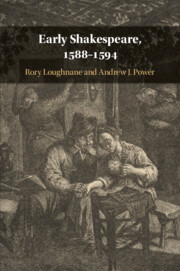Book contents
- Early Shakespeare, 1588–1594
- Early Shakespeare, 1588–1594
- Copyright page
- Contents
- Tables
- Notes on Contributors
- Acknowledgements
- Abbreviations
- Introduction Beginning with Shakespeare
- Chapter 1 Shakespeare and the Idea of Early Authorship
- Chapter 2 Collaboration and Shakespeare’s Early Career
- Chapter 3 The Language and Style of Early Shakespeare
- Chapter 4 Shakespeare’s Early Verse Style
- Chapter 5 Early Shakespeare, Chaucer, and Narrative Theory:
- Chapter 6 Poetry, Counsel, and Coercion in Shakespeare’s Early History Plays
- Chapter 7 John Lyly and Shakespeare’s Early Career
- Chapter 8 Spenser and Shakespeare: Bards of a Feather?
- Chapter 9 Arden of Faversham, Richard Burbage, and the Early Shakespeare Canon
- Chapter 10 Boy Parts in Early Shakespeare
- Chapter 11 The Origins of Richard Duke of York
- Chapter 12 Early Shakespeare and the Authorship of The Taming of the Shrew
- Chapter 13 Who Read What When?
- Book part
- Select Bibliography
- Index
Chapter 13 - Who Read What When?
Published online by Cambridge University Press: 17 April 2020
- Early Shakespeare, 1588–1594
- Early Shakespeare, 1588–1594
- Copyright page
- Contents
- Tables
- Notes on Contributors
- Acknowledgements
- Abbreviations
- Introduction Beginning with Shakespeare
- Chapter 1 Shakespeare and the Idea of Early Authorship
- Chapter 2 Collaboration and Shakespeare’s Early Career
- Chapter 3 The Language and Style of Early Shakespeare
- Chapter 4 Shakespeare’s Early Verse Style
- Chapter 5 Early Shakespeare, Chaucer, and Narrative Theory:
- Chapter 6 Poetry, Counsel, and Coercion in Shakespeare’s Early History Plays
- Chapter 7 John Lyly and Shakespeare’s Early Career
- Chapter 8 Spenser and Shakespeare: Bards of a Feather?
- Chapter 9 Arden of Faversham, Richard Burbage, and the Early Shakespeare Canon
- Chapter 10 Boy Parts in Early Shakespeare
- Chapter 11 The Origins of Richard Duke of York
- Chapter 12 Early Shakespeare and the Authorship of The Taming of the Shrew
- Chapter 13 Who Read What When?
- Book part
- Select Bibliography
- Index
Summary
The relationship of plays to their sources has always been important evidence of chronology, authorship, and the derivation of textual variants. Such evidence has been particularly important to studies of Shakespeare’s early plays. But for centuries source scholarship has been based on random anecdotes: a scholar reading one text notices something about it that reminds them of another text. We can now re-evaluate those anecdotal findings by testing them systematically against digital databases. Such tests establish that Margaret's long speech at the beginning of Scene 2 of The First Part of the Contention is based on a passage in Hall's chronicle, whereas the variants in the Folio text of 2 Henry VI instead draw upon Holinshed's chronicle. This evidence supports revision rather than memorial reconstruction. Likewise, the links between the Contention speech and Edward II are best explained by Marlowe's authorship of both.
- Type
- Chapter
- Information
- Early Shakespeare, 1588–1594 , pp. 284 - 301Publisher: Cambridge University PressPrint publication year: 2020

